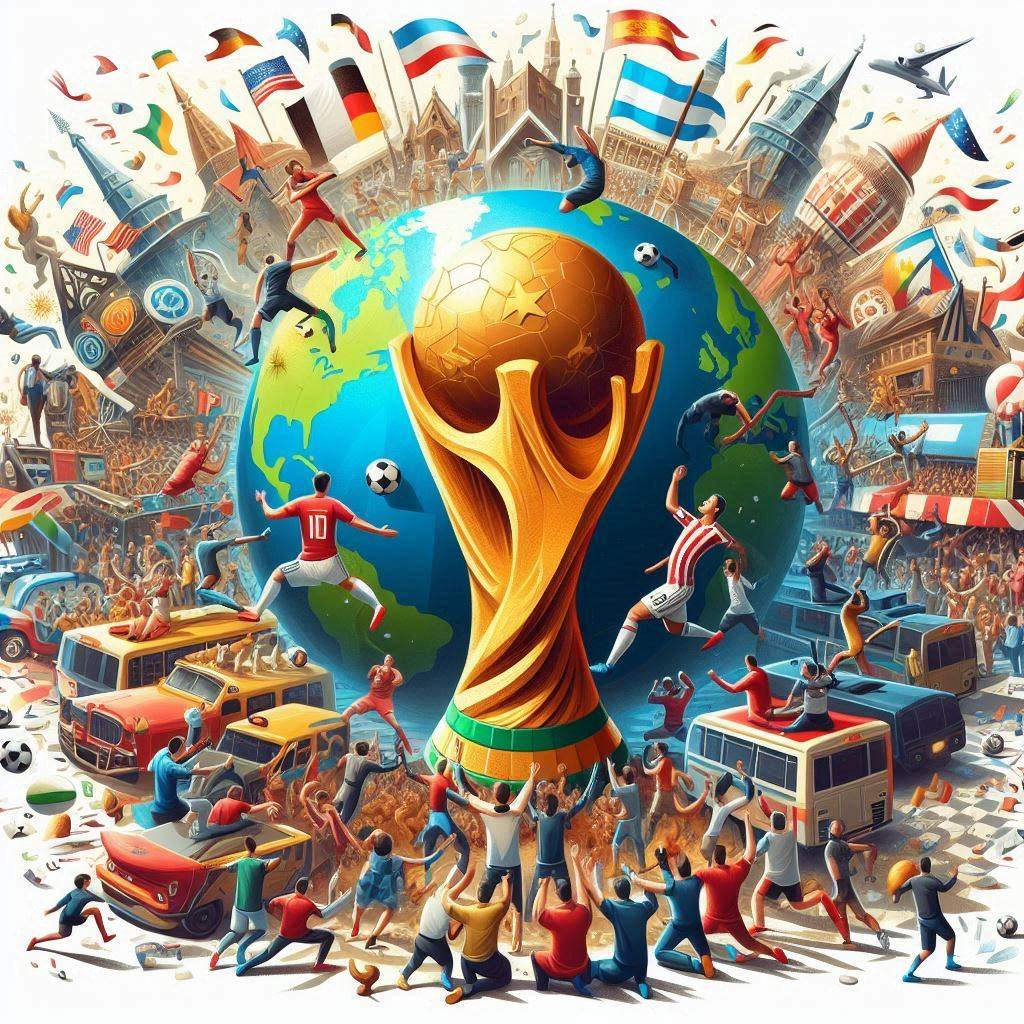Why the FIFA World Cup Is Considered a Global Event
The FIFA World Cup is more than just a soccer tournament; it’s a worldwide phenomenon that brings together people from every corner of the globe. Every four years, billions of eyes are glued to screens, millions of voices cheer, and for one month, everything else seems to take a backseat to the beautiful game. But what makes this event so special? Why is it that the FIFA World Cup is considered a global event? Let’s dive into the reasons, sprinkled with a bit of humor because, let’s face it, we could all use a laugh.
1. The World’s Most Popular Sport
Soccer, or as the rest of the world calls it, football, is the most popular sport on the planet. According to FIFA, over 3.3 billion people watched the 2018 World Cup. That’s nearly half of the world’s population! It’s like the Super Bowl, but instead of just the U.S. tuning in, it’s everyone, including your grandma who doesn’t know what offside means but is rooting for Brazil anyway.
Fun Fact: The 2018 FIFA World Cup final alone was watched by over 1 billion people. That’s a lot of eyes on the screen, and probably an equal number of nachos consumed.
| Year | Viewers | Most Popular Teams |
|---|---|---|
| 2014 | 3.2 Billion | Germany, Argentina |
| 2018 | 3.3 Billion | France, Croatia |
2. A Platform for National Pride
The World Cup is not just a competition; it’s a chance for nations to showcase their pride, culture, and identity. Countries that may not often be in the global spotlight suddenly find themselves at the center of attention. And let’s be honest, it’s the only time when people might wear a jersey at a wedding and it’s totally acceptable.

During the World Cup, flags fly high, anthems are sung with gusto, and for those few weeks, the world’s problems seem a little smaller. As The Guardian points out, football becomes a vehicle for expressing national pride and identity, turning players into national heroes overnight.
Pro Tip: Don’t ever, and I mean ever, tell a Brazilian that Pelé wasn’t the greatest. It’s like saying the sun doesn’t shine in the summer. Just smile and nod.
| Country | Most Memorable World Cup Moment |
|---|---|
| Brazil | Winning 5 Titles (So Far!) |
| Germany | The 7-1 Victory Over Brazil in 2014 |
3. The Ultimate Drama
If you think Hollywood is dramatic, you’ve clearly never watched a World Cup match. The tension, the heartbreak, the last-minute goals—it’s like a soap opera, but with fewer commercial breaks and way more yelling. The World Cup has seen it all: last-minute winners, shocking upsets, and even the infamous “Hand of God” by Diego Maradona in 1986.
Every World Cup brings with it a narrative, a story that transcends the game itself. Who can forget Zinedine Zidane’s headbutt in the 2006 final? Or South Korea’s incredible run to the semi-finals in 2002? It’s the kind of drama that keeps fans on the edge of their seats, screaming at their TVs as if the players can actually hear them.
Fun Fact: The phrase “It’s only a game” has never been uttered by a true soccer fan during the World Cup. Trust me, those are fighting words.
| Year | Dramatic Moment |
|---|---|
| 2006 | Zidane’s Headbutt |
| 2014 | Germany’s 7-1 Against Brazil |
4. Cultural Exchange
The FIFA World Cup is like a giant, international potluck, where everyone brings something to the table. Fans from all over the world gather in the host country, bringing their traditions, food, and sometimes questionable fashion choices (looking at you, England, with your full-body St. George’s Cross outfits).
It’s a celebration of diversity, a chance to experience cultures that you might only read about in books. According to UN, the World Cup fosters unity and understanding, creating a global community united by a shared love of the game. It’s the only time you’ll see a German sharing a beer with an Argentine after a match.
Pro Tip: If you ever find yourself at a World Cup match, don’t be shy to try food from other countries. Who knows, you might discover that you love sushi just as much as soccer.
| Country | Cultural Contribution |
|---|---|
| Japan | Impeccable Cleanliness and Sushi |
| Mexico | Vibrant Fan Support and Tacos |
5. Economic Impact
The World Cup isn’t just about goals and glory; it’s also big business. Hosting the tournament can bring a massive economic boost to the host country. From tourism to infrastructure, the World Cup leaves a significant mark. However, it’s not all rainbows and butterflies. Sometimes, the costs outweigh the benefits, but hey, at least you get shiny new stadiums, right?
The economic impact of the World Cup is a mixed bag. According to The Economist, the benefits include increased tourism, job creation, and global exposure. On the flip side, there are concerns about the long-term viability of the infrastructure built specifically for the event.
Fun Fact: Did you know that the 2022 World Cup in Qatar was the most expensive ever? With a price tag of over $200 billion, they could have bought… well, a lot of things.
| Host Country | Estimated Cost | Economic Boost |
|---|---|---|
| Brazil 2014 | $15 Billion | Mixed Reviews |
| Qatar 2022 | $220 Billion | Yet to Be Fully Assessed |
6. Unifying the World
In a world often divided by politics, religion, and even pineapple on pizza, the World Cup is one of the few events that truly brings people together. For one month, we forget our differences and unite under the banner of sport. Whether you’re a die-hard fan or just watching for the commercials (spoiler: there aren’t any), the World Cup is a shared experience that transcends borders.
According to BBC, the World Cup has the unique ability to bring together people of all backgrounds. It’s like a global family reunion, only with less awkward small talk and more shouting at referees.
Pro Tip: Even if your country didn’t qualify, pick a team, and join the fun. You never know, you might end up cheering for them as if you were born there.
| Region | Number of Countries Participating | Most Successful Team |
|---|---|---|
| Europe | 13 | Germany |
| South America | 4-5 | Brazil |
7. The Legacy
Finally, the World Cup leaves a lasting legacy. For the host country, it’s an opportunity to be remembered on the world stage. For the players, it’s a chance to become legends. And for the fans, it’s about creating memories that last a lifetime. Whether it’s the joy of victory or the agony of defeat, the World Cup is an event that stays with you.
According to Forbes, the World Cup’s impact can be felt long after the final whistle. From the economic boost to the social and cultural influences, the tournament leaves its mark on the world.
Fun Fact: The World Cup trophy, known as the FIFA World Cup Trophy, is one of the most recognized sports symbols in the world. It’s so coveted that even people who don’t care about soccer want to take a selfie with it.
| Host Country | Legacy |
|---|---|
| South Africa 2010 | Increased Tourism and Global Visibility |
| Germany 2006 | “A Time to Make Friends” Campaign |
And there you have it! The FIFA World Cup is considered a global event for so many reasons, from its massive viewership to its cultural significance and economic impact. Whether you’re a die-hard soccer fan or just someone who loves a good global celebration, the World Cup is an event that’s impossible to ignore. So next time the World Cup rolls around, grab your jersey, cheer for your favorite team, and remember—you’re part of something truly special. And who knows, maybe one day, you’ll get to hold that coveted trophy (or at least a replica from the gift shop).


